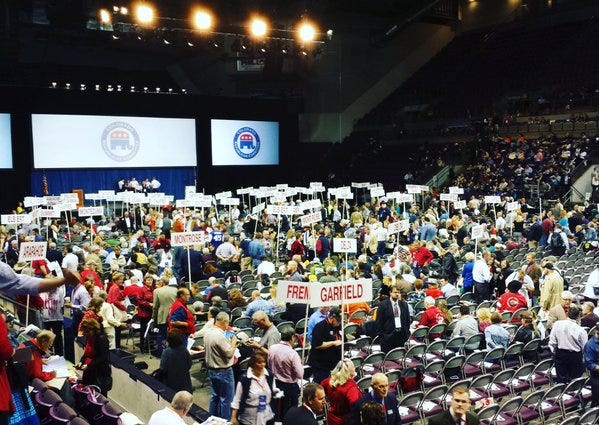
As a Colorado Republican who had caucused in prior years' elections, I was a bit disappointed back in August when I learned that the state's GOP executive committee was cancelling this year's presidential preference poll.
As a matter of curiosity, it would have been nice to find out which candidate my state was leaning toward on March 1. As a matter of pride, it would have been pleasant to hear the results reported on the national news, and discussed by national pundits. As a matter of practicality, however, it wouldn't have served any meaningful purpose to either the voters or the candidates — something that's been true for many years in this state.
You see, contrary to the impression that many people have been left with over the past couple of days, Colorado's traditional caucus-night poll had never been a binding, primary-like election. That's not how it worked. It was a simple straw-poll — nothing more, nothing less. It wasn't the process used to distribute delegates to the candidates.
The nomination procedure in this state has been driven by the election of representatives for over a hundred years (except for from 1992 to 2002). It starts with grassroots caucus attendees from local precincts voting on congressional-district delegates (their neighbors) to represent them, and ends at the state convention a few weeks later when the representatives finish selecting national delegates to back a candidate at the national convention.
Is it an easy process for outsiders to understand? No. As a delegate myself (both this year and in 2012), and therefore a functioning component of the process, even I find it confusing. I would much prefer a standard primary in my state.
That being said, the rabid, widespread claims of conspiratorial corruption being responsible for Donald Trump's crushing defeat on Saturday has come from remarkable ignorance. Either that, or willful deception.
The Colorado GOP's 2016 convention rules were publicly available for months — beginning way back when there were still 17 presidential candidates in the Republican race, and very few observers were viewing Trump as the inevitable or even likely nominee. If the Trump camp didn't understand those rules and didn't campaign accordingly, that was their mistake.
Of course, no one should have been surprised by Trump himself misrepresenting (and making excuses for) his Colorado loss. The GOP front-runner is notorious for deeming any result that doesn't accommodate his campaign to be unjust.
Sunday night on Twitter, he wrote, "How is it possible that the people of the great State of Colorado never got to vote in the Republican Primary? Great anger - totally unfair!" Minutes later, he tweeted, "The people of Colorado had their vote taken away from them by the phony politicians. Biggest story in politics. This will not be allowed!"
Lots of Trump supporters and even several in the media have signed on to the deceptive narrative. The Drudge Report was perhaps the worst culprit, running a series of breathtakingly misleading, customized headlines:
Headline: "SHOCK: Republicans cancel presidential election in CO..."
Reality: It was hardly a shock, being that the rules were first reported eight months ago. It also wasn't an "election" that was cancelled. It was a non-binding straw-poll.
Headline: "1 MILLION REPUBLICANS SIDELINED..."
Reality: The only people "sidelined" were those who didn't (or couldn't) show up on caucus night (which has been the case for several years). Those in attendance got to vote for people who shared their voting preference. And if they didn't find such people, they had the option of running themselves.
Main Headline: "FURY AS COLORADO HAS NO PRIMARY OR CAUCUS; CRUZ CELEBRATES VOTERLESS VICTORY"
Reality: Colorado state law doesn't allow for a primary. Colorado absolutely did have a caucus this year. And no, Ted Cruz's victory was not "voterless." It came from Colorado voters who were elected by other Colorado voters to represent them.
Now, I don't expect facts and rational explanations to pacify a lot of the people who are upset with the results of Colorado's delegate distribution. Like I said, I'm not a fan of the process either. But rules do matter, and they must be followed.
Trump supporters in Colorado had the same opportunities as the other candidates' supporters to make their voices heard in the nomination process. As best I can tell, they largely chose not to pursue them.
When I showed up at the state convention last Saturday in Colorado Springs, I was surprised by the lack of identifiable support for Trump. Every now and then, I'd see someone walk by wearing one of those red "Make America Great Again" trucker hats, but the overwhelming majority of attendees were proudly displaying "Ted Cruz" stickers on their shirts. From the conversations I had with a number of other delegates that day (from different parts of the state), I began to understand why the GOP front-runner was fairing so poorly.
Each of them relayed the same story: Last month, shockingly few Trump supporters showed up on caucus night to vote for district delegates. And of those who did show up, hardly any of them offered to run as delegates to make their voices count at the state convention. They just weren't interested in the job. Cruz and Rubio supporters, on the other hand, were very engaged.
Taking that into account with Trump's embarrassingly disorganized (and seemingly clueless) ground-game in the state, a big Cruz victory made perfect sense. It almost seemed as if Trump were less interested in winning Colorado than his supporters were.
Instead of that being the big story, however, charges of "corruption" and "crookedness" in my state are what is being discussed on the cable news channels this morning. Once again, Trumpspeak proves to be an excellent media distraction from questions of the GOP front-runner's competency and judgement.











